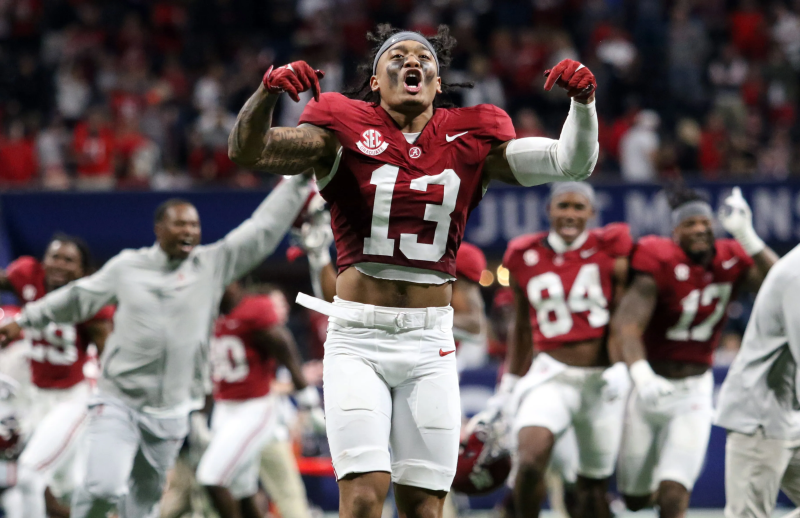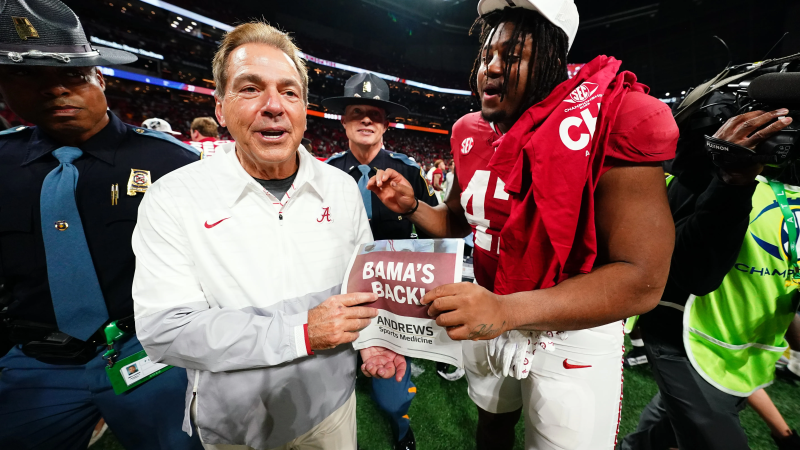College Football Playoff committee has tough task, but picking Alabama is an easy call.
ATLANTA — At some point late Saturday night, or maybe early Sunday morning, the College Football Playoff selection committee will become relevant for the first time in 10 years.
They’ll actually have to make a tough decision.
Alabama? Florida State? Texas? There’s only going to be room for two of them.
Someone is going to be heartbroken.
Someone is going to be aggrieved.
Someone is going to be wronged.
If a circumstance like this had happened before, we’d have had a 12-team playoff by now. But a decade ago, the leaders of college football gave the committee a job. Now they finally need to do it: Not with buzzwords or by hiding behind protocols but by making the most difficult call of all.
They need to actually pick the four best teams. And if they exclude Alabama after beating No. 1 Georgia, 27-24, they will have failed.
“The message I’d send is (to the committee),” Alabama coach Nick Saban said, “is we won the SEC.”

A large part of the country reads that and rolls their eyes, which is perfectly understandable. The SEC beats its chest about winning 13 of the last 17 national championships, about the number of draft picks it puts in the NFL, about the largesse of its television contract and probably a dozen other things that grate on the nerves of fans in other conferences.
But leaving out an SEC champion? And not just any SEC champion but one who defeated teams ranked No. 1, No. 11, No. 13 and No. 21 in the committee’s rankings this week? It’s impossible. On résumé, Alabama should be closer to No. 3 than No. 5 — except for one problem.
On Sept. 9, in Tuscaloosa, Alabama lost 34-24 to Texas.
And so the question for the committee is this: Does one result matter more than Alabama’s superior body of work?
That’s a real philosophical debate. But it’s the one the committee is supposed to have. It’s why the committee exists at all. And when you factor in Florida State, an unbeaten ACC champion that was so unfortunate to lose quarterback Jordan Travis to a devastating injury just two weeks ago, it becomes a test for what people value.
Is it just going unbeaten? Is it having the most quality wins of all the playoff contenders? Or is it one game that was played nearly three months ago?
We’re about to find out.
“It was never (supposed to be) about undefeated teams,” SEC commissioner Greg Sankey said Saturday. “It was about a full evaluation of the season, and it’s never been about one week.”
Given the circumstances, you wouldn’t expect Sankey to spin it any other way. If roles were reversed, his opinion would undoubtedly be different. That’s just how the game is played.
But he is correct that when the playoff was created, the committee was not supposed to just automatically accept that an undefeated team was better than a one-loss team or that all one-loss teams were created equal.
The point was to debate the differences in schedules, to look at the quality of wins and the quality of losses, and to go deeper in the analysis than what this sport had become accustomed to in the era when poll voters determined who won championships.
In practice, it hasn’t really worked out that way because it hasn’t been necessary. The committee hasn’t always picked the four “best” teams, but the end result has always been acceptable to the public because there were really no more than four viable contenders in any year since 2014 when TCU got jumped by Ohio State on the final weekend. And even that wasn’t particularly controversial since the Big 12 didn’t have a conference championship game at the time and the Buckeyes ended up winning the national title.
This is going to be different because the right answer depends very much on how you see the sport and the playoff itself.
If you see it as a reward more than a way to determine the champion, then you’re going to argue for Florida State. The Seminoles showed a lot of guts to beat Louisville 16-6 with a third-string quarterback running their offense. But without Travis, they have not looked the part of a team that would give a good accounting of itself in the semifinals.
If you see the playoff as an exercise in reductive logic, then Texas has to be in before Alabama could even be considered.
If you see it as a blend between what’s on a résumé and the eye test with a nod to the trajectory a team has been on since the beginning of the season, then Alabama has to be in regardless of what you think of the other contenders.
“We aren’t the same team we were when we played Texas,” Saban said. “So I don’t think we should be considered as that team right now, and people should look at that whole body of work in terms of what the team was able to accomplish and what they were able to do. And I think this is one of the four teams deserving to be in the playoff.”
Saban, of course, tried to argue Alabama’s way into the field last year when the Crimson Tide had two losses. That was never realistic, and Alabama was not seriously considered even though they might have been playing great football by the end.
This year is different. Alabama has the SEC title, which does count for something, and it has the best collection of wins of any team in the discussion. It would be stunning if the committee disregarded that.
“This is one of those years where, 'Why did you go to 12 teams?' is answered,” Sankey said. “But the committee’s a tough task this week and I think we’ve established ourselves this year and over time as very different from our colleagues.”
So who gets left out?
My hunch is that the discussion for the final spot is going to be between Texas and Florida State. The Longhorns looked great in a 49-21 win over Oklahoma State. Florida State was extremely limited offensively against Louisville, but that was to be expected given that its third-string quarterback, Brock Glenn, had barely played any snaps this season.
The problem for the committee is that Tate Rodemaker, who would presumably be back for the semifinals after dealing with a concussion, only played in one game against 5-7 Florida. There’s just very little data about who the Seminoles are without Travis.
But Florida State also has a résumé problem. The Seminoles’ three quality wins this season came against LSU in the opener, against Clemson (ranked No. 23 by the committee) and Louisville, which was ranked 14th this week but will drop at least a few spots. Texas’ schedule wasn’t deep with good teams, but the Alabama win is a huge trump card. Plus, the Longhorns’ only loss came on a last-minute drive to No. 12 Oklahoma on a neutral field.
Texas has a better win and a healthier roster. It isn’t a punishment to say Florida State is a much lesser version of itself without Travis; it's just reality. Texas would be the more viable team against Michigan or Washington in the semifinal, and I believe the committee will see it the same way.
If the Seminoles get left out, it will seem like a terrible injustice. In a different system, they would undoubtedly deserve a shot. But in this one, and in this particular season, someone deserving is going to be disappointed.
In the 10th and final year of the four-team playoff, the committee will spend the next hours debating a brutally tough call. Putting Alabama in should be the easiest part.

Disclaimer: The copyright of this article belongs to the original author. Reposting this article is solely for the purpose of information dissemination and does not constitute any investment advice. If there is any infringement, please contact us immediately. We will make corrections or deletions as necessary. Thank you.







